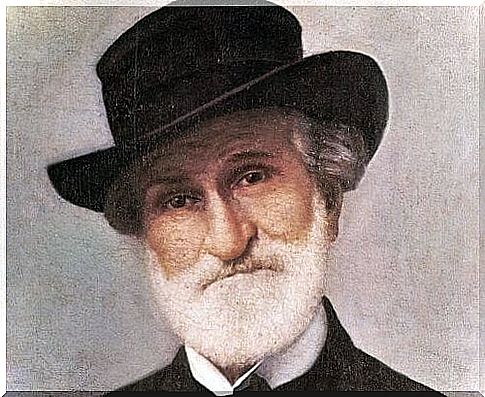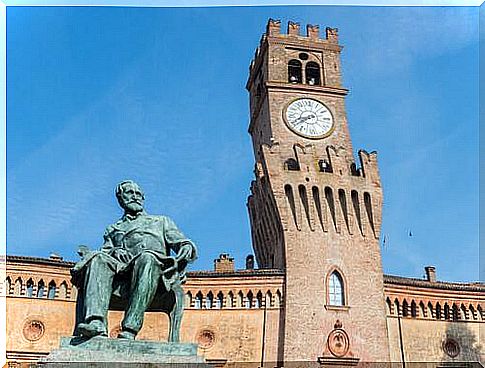Giuseppe Verdi, Biography Of A Giant

The famous musician and composer Giuseppe Verdi possessed an extraordinary talent. In addition to his work in the world of music, he was a man of numerous gifts and lived with probity, generosity and strength. His artistic and moral legacy have guaranteed him an undisputed place in universal history.
Parma, the birthplace of Giuseppe Verdi, was a duchy ruled, in succession, by Napoleon, the Habsburgs and the Bourbons until 1860, the year in which it began to form part of the new Kingdom of Italy.
In the heart of the political turmoil experienced in Italy, Verdi, armed only with his music, contributed to the unification of the country. Some passages of his works served and still serve today to incite the nationalist character of the Italian people.
Uniquely for his historical moment, Verdi composed not thinking of privileged groups of the society of the time, but for the masses. His compositions had as main elements the passions of humanity, extreme feelings such as love, hatred, jealousy and fear.

Early years of Giuseppe Verdi’s life
Giuseppe Fortunino Francesco Verdi was born on 10 October 1813 in Le Roncole, a hamlet of Parma. He was born into a humble family; his father, Carlo Giuseppe Verdi, was an innkeeper and his mother, Luisa Utinni, was a weaver. Little Giuseppe grew up in a rural and rural environment.
Around eight years old and given the child’s fascination with music, his father gave him an old spinet. The instrument was specially restored for him and Giuseppe spent hours playing. He was a gifted child, and his enormous talent was discovered by the merchant Antonio Barezzi, who became his protector.
At the age of twelve, the young Verdi moved to Busseto to go and live at Barezzi’s house. The merchant took charge of the training of the young man and offered him the best musical education. During this period, he met his teacher Ferdinando Provesi.
The desolation of his youth
When he turned eighteen and thanks to the help of his benefactor, Giuseppe Verdi changed residence again. This time, it was Milan that hosted the young musician.
Verdi was eager to present himself for the admission exam to the Milanese conservatory ; however, the prestigious school did not admit the young man, as he was too old to start his studies.
To this inconvenience was added Verdi’s peculiarity and his unorthodox way of playing the piano. Ironically, nowadays the Milan Conservatory, the same one that did not admit it in his youth, bears his name. This happened after his death, against the will of the famous musician.
In 1836, at the age of 23, Verdi married the daughter of his benefactor, Margherita Barezzi. Of this marriage two children were born. Unfortunately, however, they had to face the premature death of both, who died when they were about one year old.
At that time the young Verdi was the head of the Busseto Philharmonic Society and gave private lessons, an activity which he carried out in conjunction with the writing of his first work, Oberto .
In 1839, his first opera had not yet been presented, which is why the couple decided to return to Milan to manage the staging together at La Scala. Oberto’s premiere was fairly successful and was repeated fourteen times. Following this, Verdi signed a contract at La Scala to stage three other operas.
These were difficult years for the master, on 18 June 1840 Margherita died of encephalitis, she was only twenty-six years old. Despite his desolation, Giuseppe Verdi found himself obliged to respect his contract.
Under these circumstances he wrote his second opera A Day of the Kingdom , a comic opera. The first of the opera was presented on September 5, 1840, but it was a total fiasco and was eliminated from the program. Desolate, the maestro thought of abandoning his career as a composer.

Trying to cure a broken heart
Fortunately, Giuseppe Verdi recovered and continued with his compositions. Under the political conditions of a divided and oppressed country, Nabucco’s libretto succeeded in rekindling the flame of composition in Verdi’s heart.
The work was presented at La Scala in 1842 and, this time, its triumph was out of the ordinary. The masses inevitably felt identified with the conflict depicted in the play.
Starting with Nabucco , Verdi, first execrated by Milanese society, consecrated himself as a composer and icon of the Italian struggle for the unification of the country. The masses appropriated the “va thought”, spread throughout the nation as a song of resistance, “the hymn of the Risorgimento”.
The first masterpieces and the climax of his career
In 1851 he saw the light of his first masterpiece: Rigoletto . This success was followed two years later by Il Trovatore and La Traviata . In light of his consolidation as a composer, Verdi devoted himself to satisfying his personal musical inclination. From that moment on, his works sought dramatic certainty about musical conservatism.
The composer’s expression of research is fully manifested in the opera Aida (1871), which possesses a more accurate instrumentation and in which shorter and more integrated arias are appreciated; in other words, it has less segmentation between movements.
From this moment on, Verdi will begin his retirement as a composer, although he composed other immortal works based on Shakespeare’s texts: Othello and Falstaff .
Death and legacy of Giuseppe Verdi
At eighty-four, Verdi buried his second wife Giuseppina, who died on November 14, 1897 after several months suffering from bronchitis. The master stayed in their home in the Villa Sant’Agata, where he devoted himself to working the countryside.
During a trip to Milan, Giuseppe Verdi was struck by a stroke that caused his death on January 27, 1901. His death moved the country and society; the manifestations of respect and pain for his death were massive in the city.

Verdi left his fortune to the home of retired musicians which he himself founded as a refuge for unemployed musicians: the Rest Home for Musicians. According to his will, his body and that of his wife lie there.
This house is still active nowadays, it is a kind of retirement home for the elderly who have devoted themselves to music. A place that overflows with music in every corner, in which ancient figures of the opera enjoy their retirement and of which Verdi felt particularly proud.
Few composers have been able to write works of political philosophy, but Verdi was an exception, becoming a universal character. The great publisher loved his work and was one of the few authors who could enjoy life success and obtain important economic benefits.
Critics attacked his works for the themes of violence, suicide and libertine loves. Giuseppe Verdi, however, overcame the difficulties of life and the obstacles presented by the critics, thus managing to put his personal parameters first.








